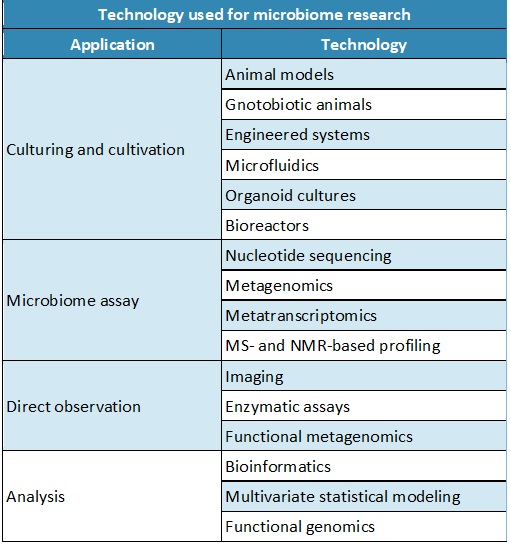
May 26, 2023
Blog Life Sciences How far are we in using the microbiome to treat illness?
The microbiome has become a buzzword, but its importance cannot really be overestimated. The human microbiomed co-evolved with human beings for millions of years. It’s almost like an organ, weighing approximately five pounds (accounting for 1-2% of human body weight). The microbiome is ever-evolving and essential to human life and health. Deviations and changes in our microbiome can reflect our environment, our diet, medications we’re taking, and external stress – but it can also reflect various health conditions.
These factors, along with the microbiome’s potential to help us better understand human health, have attracted millions of dollars in federal grants, awards and funding from venture capitalists. Technological advancements in next-generation sequencing and data analytics clubbed with modern approaches of systems biology and genetic engineering have greatly expanded the knowledge of microbial populations with human hosts.
Currently, no microbiome therapeutic is approved in the US or any other market. There are some promising candidates in Phase 3 trials (Seres Therapeutics SER109 and Rebiotix’s RBX2660), but the absence of any regulatory framework is a concern for developers. The complexity of the human microbiome and variations among different individuals add to difficulties in the design of clinical trials. Despite challenges, the hype around microbiome therapeutics is not abating: BCC Research anticipates to rise at a CAGR of 54.8% to reach $1.5 billion by 2027.
Technologies aiding microbiome research
The relationship between the microbiome and human health sparked intense research. The result has been the development of a few key technologies that allow researchers to isolate, identify, and analyse the human microbiome.
The microbiome's significance is becoming known. The environmental microbiome is known to have a significant impact on agriculture and even the global climate, while the human microbiome is intertwined with individual health. Several technologies created in recent years help us better understand and use the microbiome. Microfluidics has proven its power and importance in the field of microbiome research, avoiding the drawbacks of other more conventional methods.
Some limitations of traditional methods of microbiome research:
Slow methods that take too much time to get results
The scope of microbiome research is vast and offers innumerable possibilities for treating diseases. There is an underlying need for work in this domain to proceed quickly, with a focus on building a strong foundation for research in microbiome analysis. Conventional methods of microbiology and genomics are associated with numerous challenges, which have been deemed restraints on the growth of microbiome research.

Strategies for the development of microbiome therapeutics
Targeting the microbiome poses an immense challenge to researchers. It’s an intrinsic part of the human body, similar to an organ, but several groups are working to manipulate the microbiome to test therapeutic treatments and diagnostic approaches. Work in this field could be revolutionary to the future of human health.
In recent years, there’s been mounting evidence that imbalances in the microbiome are connected to a number of illnesses. Re-establishing harmonious bacterial populations could effectively treat these illnesses. Probiotic medicines are the frontrunners of the numerous microbiome-based treatments. Researchers from the University of Birmingham recently published results from a new study demonstrating that fecal microbiota transplantation (FMT) is phenomenally successful in treating patients with C. difficile infection (CDI). Several manufacturers of probiotic therapies recently announced positive topline results from pivotal trials assessing these therapeutics for the treatment of C. difficile infection (CDI).
Advanced tools such as metagenomics and microbiome databases have proven to be extremely useful in the exploration of therapeutic targets for drug development. Distinct types of interventions have been studied, some with much success, to allow the manipulation of the microbiome and control dysbiosis. The most-used approaches for microbiome drug development are categorized into additive, subtractive and modulatory approaches.
The future of microbiome therapeutics looks bright
Although no microbiome therapy is currently approved, there’s been a boom in the number of preclinical and clinical trials in this area. It’s hoped that in time, they can effectively be used to treat a plethora of illnesses.
BCC Research’s report dives into the global picture for microbiome therapeutics. Gain insight into the emerging regulations, market drivers, restraints, and opportunities, and the competitive landscape of the industry.
Download your complimentary report overview or purchase the report in full here. Consider becoming a member of our research library and gain access to the full scope of reports on biotechnology.

Olivia Lowden is a Junior Copywriter at BCC Research, writing content on everything from sustainability to fintech. Before beginning at BCC Research, she received a First-Class Master’s Degree in Creative Writing from the University of East Anglia.
In today’s fast-paced biomedical world, researchers and pharmaceutical companies...

Radiopharmaceuticals represent a cutting-edge frontier in modern medicine, offer...

Implantable Remote Patient Monitoring (IRPM) devices are revolutionizing healthc...

We are your trusted research partner, providing actionable insights and custom consulting across life sciences, advanced materials, and technology. Allow BCC Research to nurture your smartest business decisions today, tomorrow, and beyond.
Contact UsBCC Research provides objective, unbiased measurement and assessment of market opportunities with detailed market research reports. Our experienced industry analysts assess growth opportunities, market sizing, technologies, applications, supply chains and companies with the singular goal of helping you make informed business decisions, free of noise and hype.